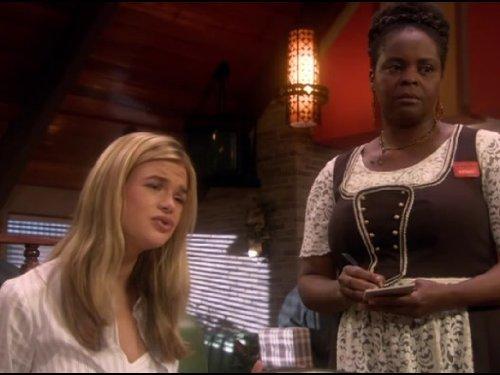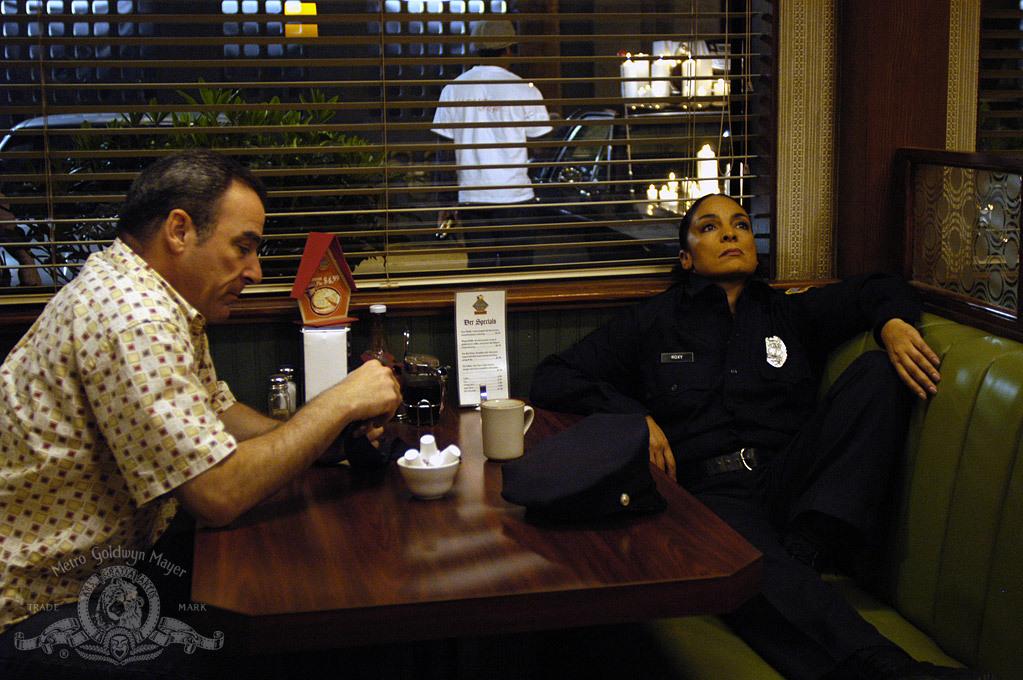Ellen Muth's 'Dead Like Me' Voice-Over Was A Narration to Die For
By Kim Handysides on April 2, 2022 at 5:30 PM EDT
Updated on April 2, 2022 at 5:45 PM EDT

George Lass was just your average, dead-eyed 18-year-old girl until a chance encounter with an earthbound toilet seat turned her body into a crater. If this sounds dramatic, it’s because it is.
Dead Like Me follows the afterlife of prolific underachiever George (Ellen Muth), who’d never really given much thought to her place in the world - at least until after her untimely death.
Charged with the duty of ferrying souls to their life after death, our narrator doesn’t have the easiest time adjusting to her newfound role as a Grim Reaper and expresses it through nearly every voiceover chance she gets.

In fact, where most narrators seem fairly self-actualized and in control of the story they have to tell, Muth’s honest, sarcastic, and sporadic commentary throughout the series serves more to track her growth as a character and allows the audience to experience the story as she does. No stranger to controversy and inner conflict, Dead Like Me only ran for two seasons and a movie, but still has a vocal fan base nearly 20 years later.
The Intro… of an Intro
Dead Like Me opens with a voiceover from our reluctant protagonist Georgia “George” Less. Using a snarky and sarcastic tone to draw us in, she begins the series by casually narrating the story of how death came to be. Poking fun at the way traditional narration goes the dramatic route when telling a myth, George tells us a more abridged and light-hearted version of the origin of death. With her own dry commentary on the characters of the story, the way she tells it is almost like a foreshadowing of her narration style for each episode of the series and gives the audience a better feel for who George is as a character before we’re even introduced to her on-screen. The way she communicates to the audience isn’t so much about instilling us with insights as it is a way for her to vent her thoughts and feelings, just like a diary.
The Diary of a Narrator
Throughout the series, our narrator speaks to us as if we were a trusted diary, and allows audience members the opportunity to witness a more human side of narration. George shares her experiences through an undiluted lens of idle sarcasm and provides us with a no-nonsense look at her [after]life, and the people in it. This not only allows us to get a more tangible feel for what it is that she’s going through but understand what she really thinks about the people around her. Even though the narration doesn’t necessarily saturate every scene of the series, it does punctuate what she considers to be critical moments in need of an extra level of insight.

While George does chime in to reveal extra information during these crucial moments, the context she provides is sometimes less than necessary, and gives the audience the feeling that she just needs someone to talk to… or at. This style of narration is so interesting because instead of just giving us a simple objective exposition, she wants us to feel what she feels and know what she knows before getting the narrative going. A perfect example of this would be when we’re introduced to her family during the pilot episode. George goes through the effort of presenting her parents by their first names, star signs and flaws, instead of any of their redeeming qualities - as if to almost illustrate the contempt she has for her home life. As an audience, we feel this the most because it’s all we know about them and only have George’s disgruntled opinion to go off of. By highlighting her parents’ transgressions, George gives us a crash course on her dysfunctional family, and how much she hates the entire situation.
Even the way she describes her younger sister, Reggie, is almost entirely without cause and just comes off as intentionally hurtful for the sake of being hurtful. What we see here isn’t a narrator that exists to inform us on the important things or keep us in the loop, but rather, a speaker that just wants to complain about anything and everything when given the opportunity.
A Sarcastic, Unlikeable Narrator
Instead of being given a fully-formed and omniscient speaker, George’s voice-over provides us the chance to hear her innermost thoughts and feelings as she experiences and grows past them - whether we like it or not.

What you see is what you get, and relatable as she can be at times, George is apathetic and jaded as they come. Simply put, she’s not exactly the most likable of characters, and her voiceover doubles down on the precedent. If for nothing else, we’re given the chance to witness her growth as a person and notice the subtle changes in her personality and thought process throughout the series. The irony that George had to die in a freak accident at a young age in order to find a path isn’t lost on viewers, and she even points it out to the audience at the end of the pilot episode. We’ve all felt lost at times, and that’s perhaps the most endearing aspect to her character.
It’s a Wonderful Life
As we progress through the first few episodes, you can hear the sadness in her voiceover where there was once bored wit and dry sarcasm; longing where there was once apathy. By losing everything she thought she hated, George gained the insight that it wasn’t half as bad as she initially believed it to be. Almost like a nod to the 1940’s classic, It's a Wonderful Life, the moment George is lost to a strange world and unable to interact with her family, she begins to miss them and the life she had before. George wants nothing more than to wake up in her old life with a renewed appreciation for the people in it, but she can’t; unlike George Bailey. Instead, she has to adjust to a new life and responsibilities that she isn’t exactly equipped for, and it’s reflected in her narration throughout the series. It’s amazing how even a slight shift in tone from a narrator can help you feel remorse for an otherwise unlikeable character in the span of an episode or two.
Metacommentary
Dead Like Me may have only lasted for two seasons, but it fits so well in the wheelhouse of creator Bryan Fuller. While the series was nominated for two Emmys, it never quite took them home, but that’s perhaps more to do with its short runtime.
No stranger to using a narrator to tell his stories, Fuller has had a hand in heavily narrated titles like Pushing Daisies, American Gods and Hannibal, to name only a few. It’s always amazing to see how certain creatives lean in or away from the use of narration in their work.
With such an impressive repertoire to show following his involvement in the 2003 hidden gem, it's (sadly) no surprise that it quickly fell apart following his departure from the series five episodes in. Supposedly over creative differences with studio execs, Fuller left the series and went on to pursue other projects like Heroes - yet another series of his creation that takes advantage of the use of narration to tell its intricately woven story.
Kim Handysides is an award-winning voice artist, coach and thought leader in her industry. Her narrations have been heard on Discovery, Netflix, and the major networks, in iMax, the White House and the Smithsonian.